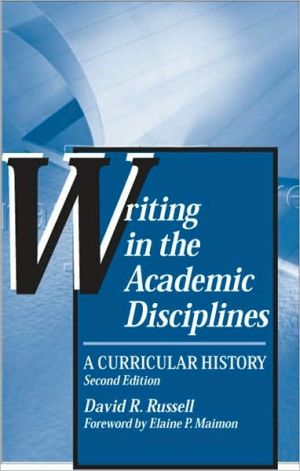

 |

|

The average rating for Writing in the Academic Disciplines: A Curricular History based on 2 reviews is 3.5 stars.
Review # 1 was written on 2013-02-25 00:00:00 Robert Murdoch Robert MurdochRussell's book traces the history of writing across the curriculum and writing in the disciplines from the late nineteenth century through 2000. He argues that the "myth of transience"--the notion that writing can be taught in an isolated and temporally limited manner, has persisted in twentieth-century education. This is despite the fact that, alongside the rise of "mass education," disciplinary and professional discourses have grown increasingly specialized and divergent. He traces WAC and WID programs as potential ways out of both the myth of transience and the transparency of disciplinary rhetorics. His historical study begins by noting nineteenth-century universities' shift from a rhetorical education designed to produce orators to an opaque approach to teaching specialized professional writing (69). Russell then spends a great deal of time tracing out three primary approaches to reforming writing instruction that arose in the "Progressive Era," all aimed at re-establishing various forms of "community": First, the efficiency-driven reforms of "administrative progressives" (137), an approach Russell sees as having the most lasting influence. Next, the "great books" approach of "liberal culture." Advocated directly or indirectly by such academics as I. A. Richards and F. R. Leavis, this approach assumed "a proper education produces deep thoughts, which cannot help but find their proper expression" (175). Finally, the "progressive general education" of Deweyans based on organic metaphors of growth and development--the approach Russell seems to present as the most genuinely progressive and promising option (200). Though proto-WAC programs came and went alongside these various "progressive" reforms, it isn't until the 1970s that Russell sees the rise of WAC proper. He traces the influence of James Britton and British education theorists on early American WAC programs, then examines programs at UC-Berkeley and Colgate. He ends by noting various approaches to writing instruction in the last decade of the century (writing centers, writing-intensive courses, computer-aided instruction, etc.), as well as the fallacious antagonism between WAC and WID. Though he still sees WAC as somewhat marginalized due to "institutional inertia" and the myth of transience, he sees it as having "made important strides" toward "bridg[ing] the gap between student-centered and discipline-centered education that has marginalized writing for so long" (332). |
Review # 2 was written on 2008-03-14 00:00:00 Kevin Kees Kevin KeesDavid Russell is just an amazing writing historian. He covers the history of writing as an academic discipline in a really complex and engaging way. For anyone who's curious about such things, I think this this is a very interesting read even if you're not doing research in composition, though it is academic. In my thesis, I'll probably incorporate his argument about the "myth of transparency" of writing--that is, the tendancy not to be able to see writing issues as such because they are so normative that they are taken for granted. Professors are often unaware of their own disciplinary writing conventions as conventions, but rather see them as the "right" way to write. |
CAN'T FIND WHAT YOU'RE LOOKING FOR? CLICK HERE!!!